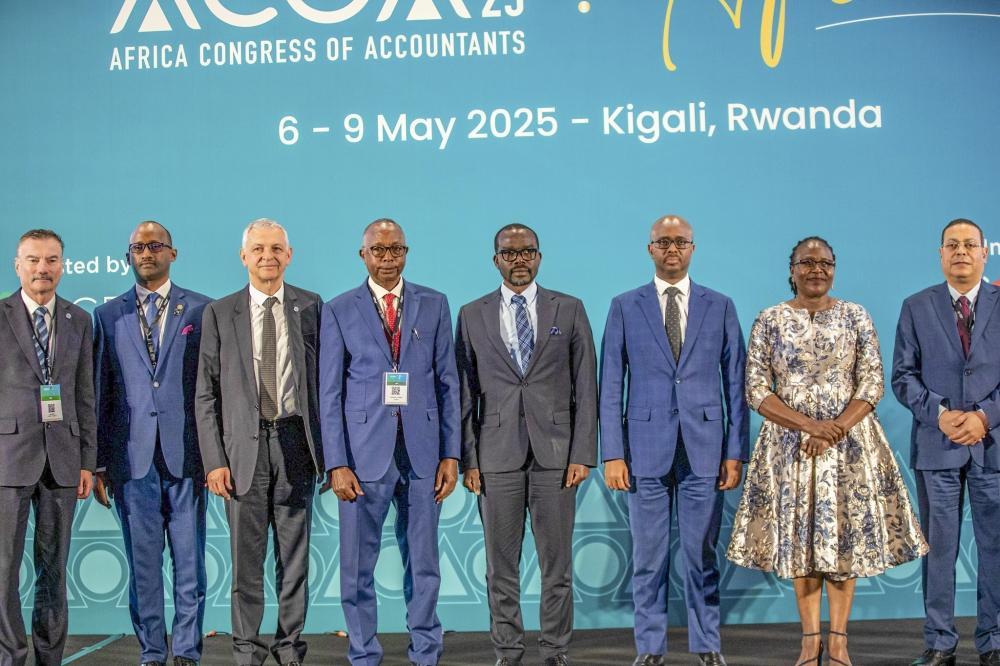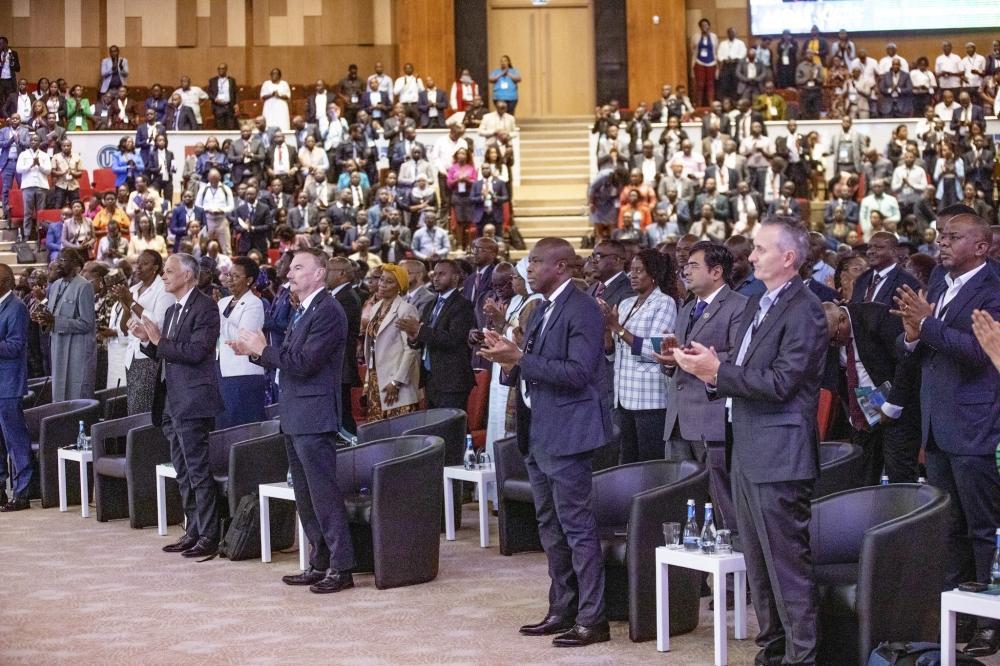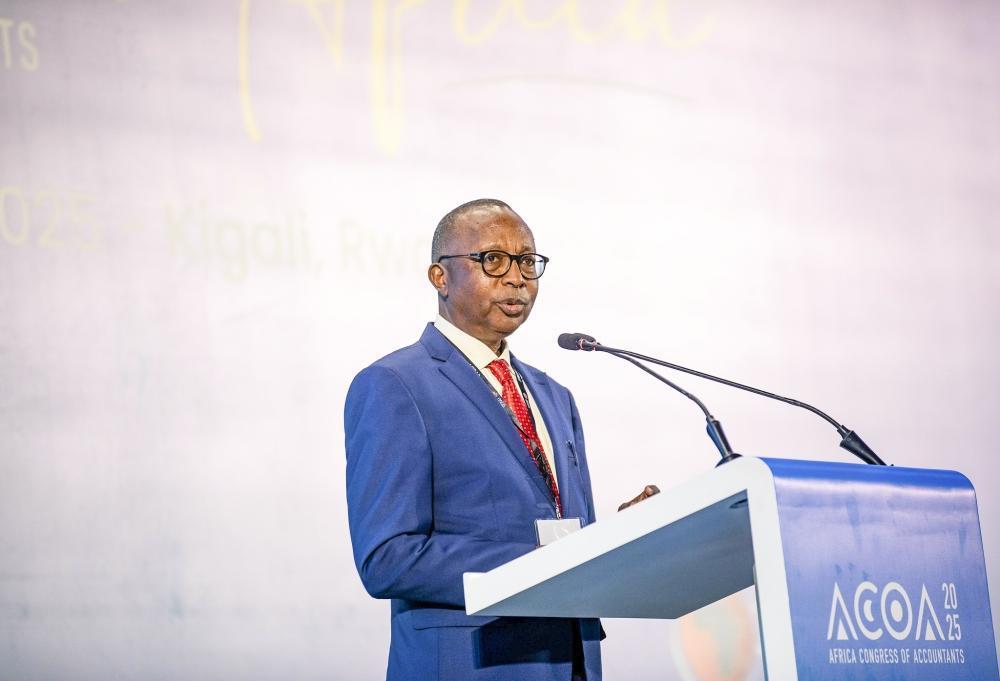Africa-Press – Rwanda. Professionals at the just-concluded Africa Congress of Accountants (ACOA) in Kigali have sounded the alarm over the continent’s widening accountancy talent gap, rallying for urgent action to help build a pipeline of future-ready professionals.
The congress, hosted by the Institute of Certified Public Accountants of Rwanda (ICPAR) in collaboration with the Pan African Federation of Accountants (PAFA), drew over 2,000 participants from across Africa and beyond.
However, as the curtains came down, professionals questioned who would serve as Africa’s next generation of accountants in a rapidly evolving economy?
According to Sanjay Rughani, the chief executive at Standard Chartered Bank Uganda, Africa’s working-age population currently stands at 460 million and is expected to reach 600 million by 2030 and 1 billion by 2050.
More than 2,000 professional accountants and finance experts from across Africa gathered for the bi-annual event.
Yet, he pointed out, the number of professional accountants across the continent is just 125,000, barely meeting the demand from Africa’s estimated 44 million businesses.
Rughani, who also doubles as the chair of the International Federation of Accountants (IFAC) Professional Accountants in Business Advisory Group, maintained that the skills shortfall reflects the continent’s broader economic fragility, particularly for youth.
“Only 3 million out of 12 million African youth graduating annually are meaningfully employed. If we don’t act now, we’re sitting on a ticking time bomb. This is not just about the future. It’s about now.”
In the case of Rwanda, ICPAR chief executive Amin Miramago said the shortage of accountantsis significant , despite several initiatives that have been put in place to attract a youthful pool of talent.
“In Rwanda, we have 300,000 registered businesses and only 1,200 qualified accountants. That’s a gap we cannot afford to ignore,” he added.
The CEO of ICPAR, Amin Miramago pointed to the growing disconnect between classroom learning and market expectations.
“Our review cycle for curricula is outdated. Five to ten years is too long in a fast-paced world. Employers say our graduates lack soft skills like communication, teamwork, and leadership,” he reiterated.
It is against this background that ICPAR is set to roll out a “digital transformation strategy” that will make qualifications accessible online in the coming quarter, according to Miramago.
“All qualifications will be accessible online, aiming to reduce the urban-rural divide and fast-track access to quality education across Africa,” Miramago said.
“Africa cannot afford to wait another 100 years to catch up. We must leapfrog using technology, collaboration, and urgency.”
Obadiah R. Biraro, President of ICPAR addresses delegates at the Africa Congress of Accountants (ACOA) on Tuesday, May 7. Photo by Dan Gatsinzi
Beyond education, Rughani argued that the private sector must play a central role in shaping Africa’s talent ecosystem.
“More than 90% of Africa’s employment is in the private sector. Yet too often, policies and educational programmes are shaped without engaging this crucial stakeholder.”
He proposed a regional specialisation model to avoid duplication and build centres of excellence across the continent.
“One region can lead on tech, another on green finance, another on SME development. If we all try to do everything, we fail to do anything well,” Rughani said.
He also rallied policymakers and the private sector to position the continent as a hub for export-ready talent.
Keto N. Kayemba, the outgoing President of the Pan-African Federation of Accountants (PAFA), believes there should be a shift toward purpose-driven accounting.
“Our mandate in PAFA is to enable accountants to lead Africa’s transformation through sustainable value,” she stated. Kayemba stressed that accountants must embrace their role in embedding sustainability principles into corporate governance and reporting, helping nations align with global environmental and social priorities.
Jean Bouquot, President of the International Federation of Accountants (IFAC), stressed the need for a unified professional approach to continental challenges.
“The future of accountancy is inseparable from the future of the planet. We are witnessing a structural shift where financial performance is no longer enough. Stakeholders are demanding clarity on environmental and social impact.”
Bouquot pointed to the rising global trend of integrated reporting, where sustainability metrics sit alongside traditional financial disclosures, redefining corporate accountability and transparency.
New roadmap, premises unveiled
At the margins of the congress, ICPAR also launched a national plan to guide companies in reporting how their businesses impact the environment, society, and the economy; the roadmap for the implementation of the International Sustainability Standards
The “roadmap”, announced during the ACOA, follows Rwanda’s adoption of global sustainability reporting rules known as the IFRS Sustainability Disclosure Standards.
These standards help investors to, among others, understand how companies manage risks like climate change or social impact, making it easier to decide where to invest.
Rwanda joins countries like Kenya, Nigeria, and South Africa in taking up these international standards. Bigger companies are expected to report first, with smaller ones following over the next four years.
The move, ICPAR said, is expected to boost transparency, improve investor confidence, and make Rwanda more attractive for responsible investment.
Wilson K. Kaindi, Chair of the ISSB Steering Committee at ICPAR, Partner Country and Country Director of KPMG Rwanda, believes that the roadmap is a product of research and collaboration with various government agencies and development partners.
“The roadmap has been researched, and we ensured that it is practical and meets the national development goals in relation to sustainability, but also gives investors the information needed to invest in the country,” he said.
Kaindi added that the roadmap is a “live document”—one that will continue to be improved as it is put into practice. He said that it will require continued input from different stakeholders to deliver the intended results.
Also unveiled is ICPAR’s new Rwf1.5 billion premises, based in Kacyiru, Kigali.
Established in 2008, ICPAR regulates Rwanda’s accountancy profession and oversees training, certification, and compliance.
The institute now has over 1,200 certified accountants, with more than 40% actively practicing locally and internationally.
For More News And Analysis About Rwanda Follow Africa-Press








